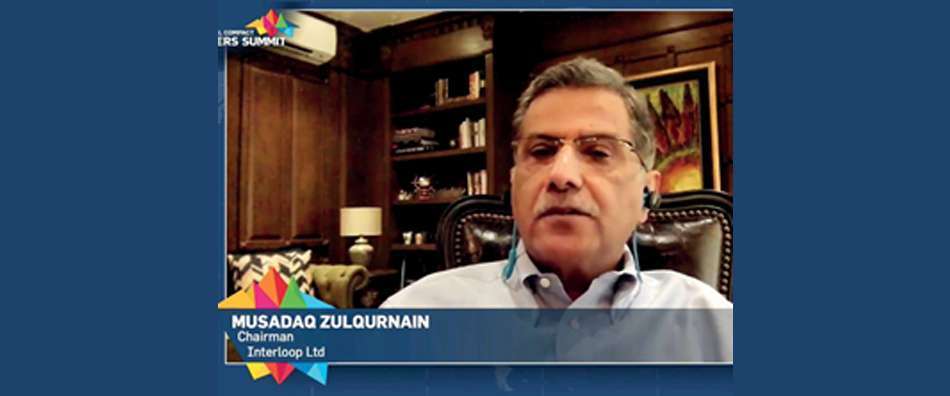At the UN Global Compact, Leaders Summit held online in June 2021, Musadaq Zulqarnain, Chairman Interloop Limited along with other Global Leaders spoke at the panel discussion on “South Asia Response to Global Issues: Decent Work, Labour & Consumer Rights”, hosted by South Asia – Nepal, Pakistan, Sri Lanka, and Bangladesh.
Speaking of measures Interloop has taken in combating COVID’19, Musadaq said that we at Interloop assured the continuity of business during the global crisis, by assessing organizational exposure and positioning ourselves to appropriately support key stakeholders, employees, and customers. We rolled out a detailed policy and pandemic recovery plan, ensuring vaccination of 100% of employees at all manufacturing facilities in Faisalabad and Lahore with the help of the Government of Punjab. We stopped all non-essential expenditure, suspended all CAPEX investments so that we could have enough to provide essentials to our people, and secured their jobs and livelihoods by not laying off any of our employees. During the outbreak, Interloop spent around PKR 70 million to help the community fight this pandemic. Talking about investing in the people, Musadaq briefed about the trainings and awareness sessions regularly conducted for the employees with Health Enables Return (HER) & LEVIS, Fair Trade, and Amazon, etc. focusing on worker health and well-being, fair wages, and benefits for business & workers.
Developing the female workforce and providing them with equal opportunities for economic uplift has always been high on our agenda. We have Re-connect program, availability of daycare centers at all our facilities for working mothers, door-to-door pick and drop service, and positions for females having STEM degrees. We have 699 females with STEM degrees including 86 related to Textile, 50% fresh female graduates are inducted through Management Training Officer Program every year, and 70% female retention rate after parental leave. We see a future with men and women working and thriving together.
Commenting on tackling Child Labour issues, he stressed that education, skill development, and entrepreneurial mindset are important tools to elevate the youth and mentioned that Interloop has collaborated with TCF and built 29 schools including primary, secondary, and higher secondary campuses providing quality education to around 4000 marginalized children including 50% girls. Other than that, we support many youngsters through scholarships for higher education. He emphasized that private and public organizations should work together to create a better life for future generations.
Addressing the global shift towards digitalization as an impact of the pandemic, he said that landscape of work environment and doing business is rapidly shifting. While we are adapting to automation and agility, we must strive to strike a balance between technology and human resource management to minimize any adverse effects on job opportunities, to ensure economic growth. Skill enhancement of the workforce as per requirement of the digital era is imperative and the role of organizations becomes crucial. According to him, revised educational qualifications are required which are digital savvy and enable people to work from home. Further, the current need is to start adding new service sectors designed flexibly for people.
Another panelist, Dagmar Walter, Director of ILO Decent Work Team South Asia and India, accentuated UNGC’s call for a coordinated international plan for governments and businesses to unite & remain committed to the realization of workers human rights, in line with the UN SDG alliance to eliminate child and forced labor. Also, she echoed UNGC’s guidance to companies on upholding the labor principles and standards as essential for realizing the labor rights of workers and for promoting decent work and inclusive growth in South Asia.
Nina Smith, CEO of GoodWeave International in Nepal shared how GoodWeave helps in formalizing such work sites to address the labour rights issues. She emphasized that global brands should partner with different organizations in the region to address these issues. She further shared that a policy shift is being observed in EU and US markets, such as child labour due diligence law and mandatory human rights laws, which could also have positive impacts.
Krishan Balendra, Chairman of John Keells Holdings PLC, Sri Lanka said that increasingly the consumers are becoming conscious of the practices of suppliers, and hence it has become important to have as much transparency as possible. He said that this could be possible through robust supplier code of conduct to monitor suppliers across various criteria including their labour and environmental practices.
Mia Seppo, the UN Resident Coordinator in Bangladesh and moderator of the session emphasized on the need of great leadership to provide strategic direction and to take determined action. She shared that Global Compact can play a big role in facilitating multi-stakeholder collaboration, innovative thought leadership, transparency in reporting of progress.
